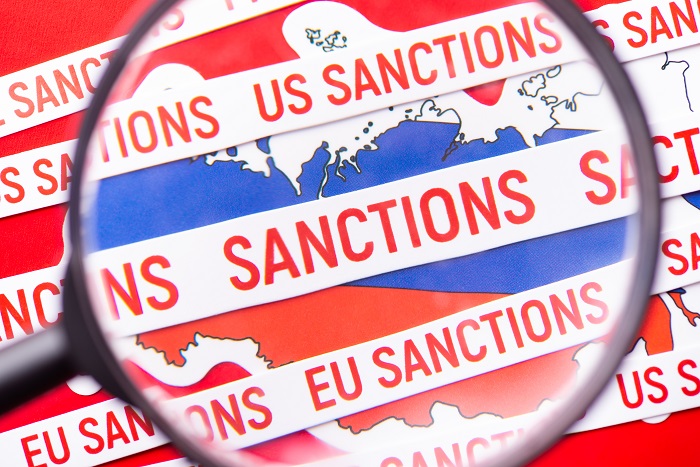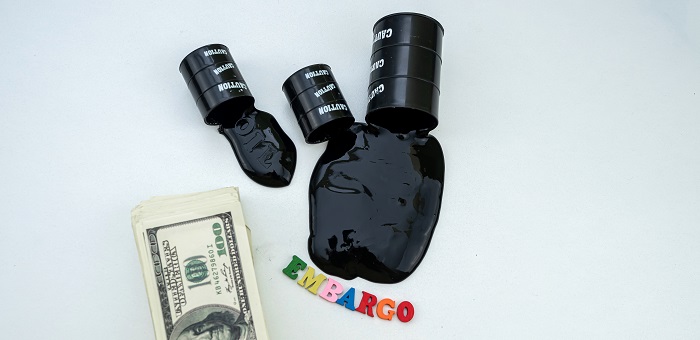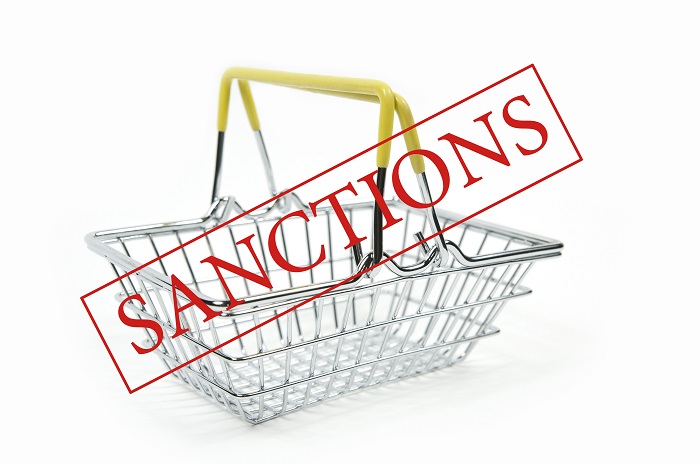Iran and Libya sanctions imposed by the US were imposed to restrict any person making investments that have a direct significance of enhancing Iran’s ability to develop its energy sector and on the individuals or entities who export items that can enhance them to make weapons for mass destruction.
Factual Situation
In the year 1971, the United Arab Emirates (UAE) and India signed a trade agreement in which India agreed to buy oil from the UAE and to supply steel and other items to the UAE. The subsequent events, including the US President’s cancellation of oil imports and the retaliatory actions, vividly illustrate the complex interactions central to Cross-Border & International Law and relevant Legal Practice & Specialization. The President of the United States (USA) cancels a large amount of oil imported into the United States. In response to this, UAE took all the USA property which holds the value of $1 billion UAE prohibited the import of US products. In December 1973, the US imposed sanctions against the UAE for importing all goods from the UAE. As per the above case study, we can understand that sanction is an action or an order given by a country in order to force the other country to obey the International laws without providing permission for any financial support to that country.
The United States Congress had enacted the Iran and Libya Sanctions Act of 1996 (ILSA) on 5th August 1996 which was further renamed as Iran Sanctions Act, 2006 (ISA) in 2006. The main objective behind the enactment of this act is to prohibit firms, entities, or individuals to trade with or invest in Iran and Libya due to their support of International Terrorism, especially, the terrorist organizations like Palestine Jihad, Hamas, and Hizbullah that can result put the national security and foreign policy interests of the USA in danger.
Types of Sanctions
There are primarily two types of sanctions that cover major aspects of International laws, they are, Primary sanctions and Secondary Sanctions.
You can read more about the definition of sanctions in here:
Sanctions: What It Really Means
Primary Sanction
These are the sanctions which are basically economic restrictions upon the transactions or entities that are related to the US jurisdiction. This includes:
- All organizations based in the US
- Persons residing in the US
- Citizens and permanent residents of the US
- Transactions on the basis of the US financial system
- Entities based in the US and their foreign branches
Secondary Sanction
Whereas, Secondary sanction doesn’t require any connection with the US. The purpose of this sanction is to deter Non-US persons from engaging in any activities that can endanger the national security of the US.
Iran and Libya Sanctions Act of 1996 (ILSA)
In the year 1995, President Clinton signed an executive order to ban US trade and investment in Iran’s energy sector on the basis of the following findings by the United States Congress, they are as follows:
- The Government of Iran supports the act of International Terrorism by supplying weapons to terrorist organizations such as Hezbollah, Hamas, and Palestine Islamic Jihad which is against the national security and foreign policies of the US and other countries who have the same policies as the US.
- The objective of congress is to prevent the supply of weapons that can create mass destruction. It requires more effort for Iran to acquire any financial means which can further support the production of chemical, nuclear, and biological weapons.
- Iran promotes International terrorism and assists its nuclear weapons through the use of diplomatic facilities and quasi-governmental Institutions.
- The main objective of the enactment of ILSA and imposing sanctions on Libya is because of its failure of it to follow resolutions 731, 748, and 883 of the security council of the United Nations and its support of International Terrorism.

Iran Sanctions Act 2006 (ISA)
Since the enactment of ILSA in 1996, it has been expanded to the other industries of Iran. The act was renamed in 2006 as the “Iran-sanctions Act” after Libya was excluded from the act.
ISA is the first extra-territorial sanction on Iran. However, it doesn’t impose any sanctions on buying crude oil from Iran.
Key Sanctions Under ISA
There is a number of transactions that are not allowed under the provisions of ISA, they are:
A. Investment to Develop Iran’s Energy Sector (Oil & Gas)
The foremost violation of ISA would be when an individual or an entity makes an investment of more than $20 million in Iran’s energy sector within one year. Here, the definition of the energy sector includes liquified natural gas (LNG), Oil, LNG tankers, etc.

B. Sales of Advanced Conventional Weapons
Section 5 (b)(1) of ISA, 2006 provides to sanction firms or persons who are involved in selling the following to Iran:
I. Chemical, biological, nuclear weapons or technologies.
II. Unsettling the number of weapons.
III. If the person or an entity has the actual knowledge that the receiver of products in Iran.
C. Sales of Gasoline to Iran
Section 5 of ISA sanctions Iran’s importation of gasoline. It prohibits the sales of over $1 million dollars in a single transaction of gasoline except for fuel oil (which is a petroleum by-product). It also prohibits the sales of equipment or services that can help Iran to import gasoline.
D. Provision of Sanctioning Firms for The Equipment of Oil, Gas, and Other Petroleum Products
Both Section 5 and section 6 of ISA sanction firms to provide $1 million dollars or more in a single transaction worth of goods or services that Iran would use to maintain or enhance its oil and gas sector or $250,000 for the expansion of production of petrochemical products.
E. Transport of Iranian Crude Oil
The Iran and Libya Sanctions act, sanctions the entities who own a vessel that can be used for the transport of Iranian crude oil or who is participating in a joint venture of oil and gas development with Iran or outside of Iran, if the venture came into effect after 1st January 2002.
D’amato Act
The above sanctions are a threat to Iran’s economy, especially its petroleum sector which produces 20% of Iran’s GDP. When ISA was first developed, its oil industry and petroleum sector were underdeveloped and needed some major financial support or investments.
When U.S. allies refused to agree with Clinton’s decisions, the United States Congress found it necessary to ban their investments in Iran. Therefore, in November 1995, Iran opened its first energy sector which needed foreign investments. Iran developed a foreign investment program which is named as “buy-back program” in which foreign institutions invest in the energy sector of Iran.
On September 8, 1995, Senator Alfonse D’Amato from the United States Congress introduced the “Iran Foreign Oil Sanctions Act” or the D’amato Act in order to sanction the foreign firms for the exports to the energy sector of Iran.
Renewal and expiration of ILSA and ISA
ILSA had a limitation of five-year which was supposed to end on 5th August, 2001. However, some members of the congress were against the sanctions as they claim that it has hindered the bilateral relations, whereas other members argued that there should be an allowance of the sanctions. The Act was renewed in 2006 which was renamed as ISA as it is no longer applicable for Libya. Again in the year 2016, the Act was extended for the next 10 years.
To Sum Up
The Iran and Libya Sanctions Act of 1996 (ILSA) was a 1996 act of the US Congress that imposed economic sanctions on firms doing business with Iran and Libya. On September 20, 2004, the President signed an Executive Order to terminate the national emergency with respect to Libya and to end IEEPA-based economic sanctions on early mentioned Country.
Be noted that the Iran and Libya Sanctions Act empowers the President to waive sanctions on a case-by-case basis, which is subject to renewal every six months. As at March 2008, ISA sanctions had not been enforced against any non-US company. Despite the restrictions on American investment in Iran, FIPPA provisions apply to all foreign investors, and many Iranian expatriates based in the US continue to make substantial investments in Iran.
LegaMart is a global legal platform designed to connect individuals, startups, and businesses with qualified lawyers across jurisdictions. With a mission to simplify cross-border legal services, LegaMart provides users with access to a diverse network of vetted legal professionals who specialize in areas such as international law, corporate law, immigration, dispute resolution, and more.
By leveraging technology and user-friendly tools, LegaMart allows clients to search for lawyers by country, language, or legal expertise, submit their legal queries, and receive tailored legal solutions in a streamlined, efficient manner. The platform serves as a bridge between legal professionals and clients who need multilingual, multi-jurisdictional support — especially in today’s increasingly globalized legal landscape.
Whether you’re an entrepreneur launching a business abroad, an individual dealing with immigration paperwork, or a company navigating cross-border compliance, LegaMart aims to make legal help more accessible, transparent, and collaborative.




